How To Make Vinyl Record Cleaning Fluid
Vinyl records are more popular than e'er. Their distinctive sound, and immersive, tactile listening feel has solidified the format as the ultimate fashion to own music.
When properly looked later on, your vinyl record collection will terminal a lifetime and beyond, and a huge function of this is keeping your vinyl clean. About importantly of all, make clean vinyl records sound amazing, and while some people discover comfort and nostalgia in a picayune surface, we want to keep this to a minimum for the best listening feel.
Follow our ultimate guide on how to clean vinyl records, and you lot'll be dorsum to spinning glorious tunes before you know information technology.
The guide is broken into iii sections to help you lot get up and running as speedily as possible. Plus bank check out our total video guide embedded below for a visual demonstration.
Guide Navigation:
- PART 1 – How to Make clean Vinyl Records by Hand
- PART 2 – Pace Up Your Game with a Record Cleaning Motorcar
- PART 3 – Frequently Asked Questions & Pro-Tips For Better Cleaning Results
Office 1 – How to Clean Vinyl Records by Mitt
Time needed:five minutes.
The easiest and cheapest way to clean vinyl records is undoubtedly past mitt. With years of experience and inquiry, this is the best way we know of to manually make clean a tape by hand.
- Make clean Off Loose Grit with a Carbon Fiber Record Brush
The get-go step in any vinyl cleaning procedure should e'er be a dry clean using a carbon fiber record brush. We like the Audio Quest castor shown beneath has smaller fibers in greater quantity than a standard brush, plus improved electrical conductivity to help neutralize static.
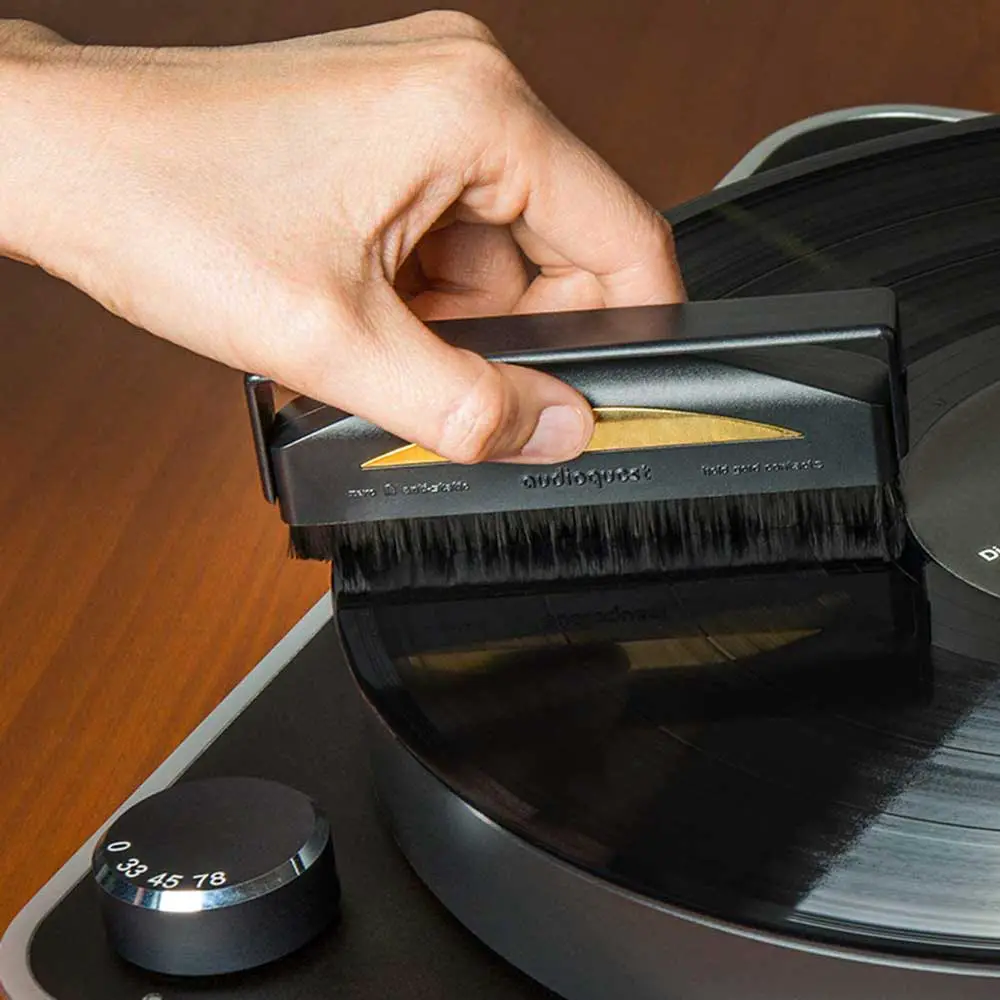
- Select The Right Record Cleaning Solution
With as much loose dust and particles removed as possible, we tin safely progress to wet-cleaning the record. Failing to dry clean before this footstep will only risk pushing the loose dust into the groove to become sludge, which is hard to remove.
For this step, you will need a record cleaning solution and a few other chip of kit:
GrooveWasher is by far our current favorite record cleaning fluid. Their G2 Fluid is a unmarried-pace cleaning method that leaves no balance behind, fugitive the demand for any secondary rinse. The company performed years of research and testing, guided by the popular 1970s Discwasher. We've tested countless cleaning solutions on the market, and on rest, GrooveWasher is the fastest and nigh convenient manual hand-cleaning solution available. (GrooveWasher is bachelor worldwide. Shipping is free inside the U.s.).
(Sound Matters readers receive 10% off direct orders from GrooveWasher when using the discount code: SOUNDMATTERS10) . (Eu/United kingdom Customers can use the same disbelieve code at twelve-inch.com).
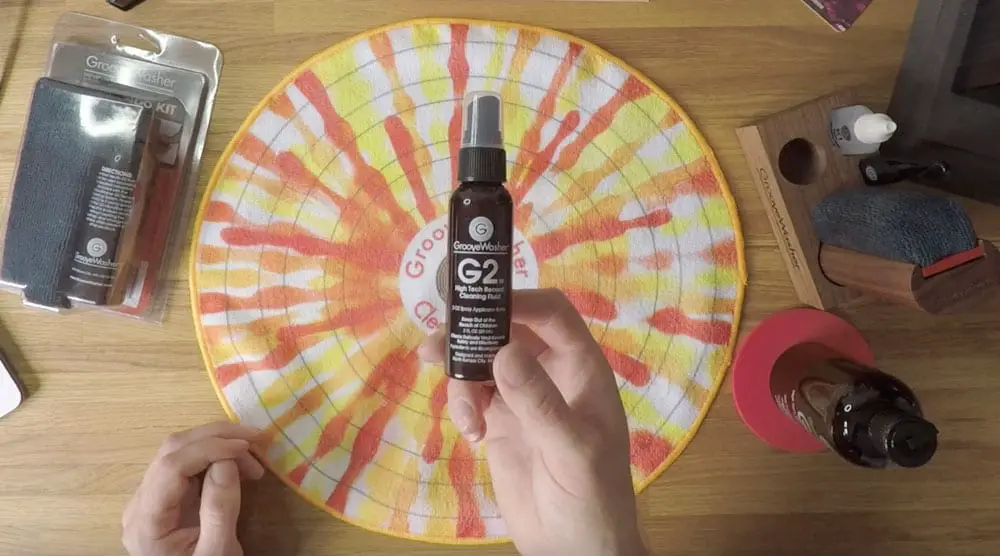
- Apply The Tape Cleaning Fluid
Advisedly place the record on the microfiber towel included in your GrooveWasher kit.
(If your kit does not include this towel, use a soft clean fabric or tape cleaning mat). Place the record label protector deejay on the tape label. Spray v or 6 mist sprays to completely comprehend the record surface. Wait 10 seconds or more than.
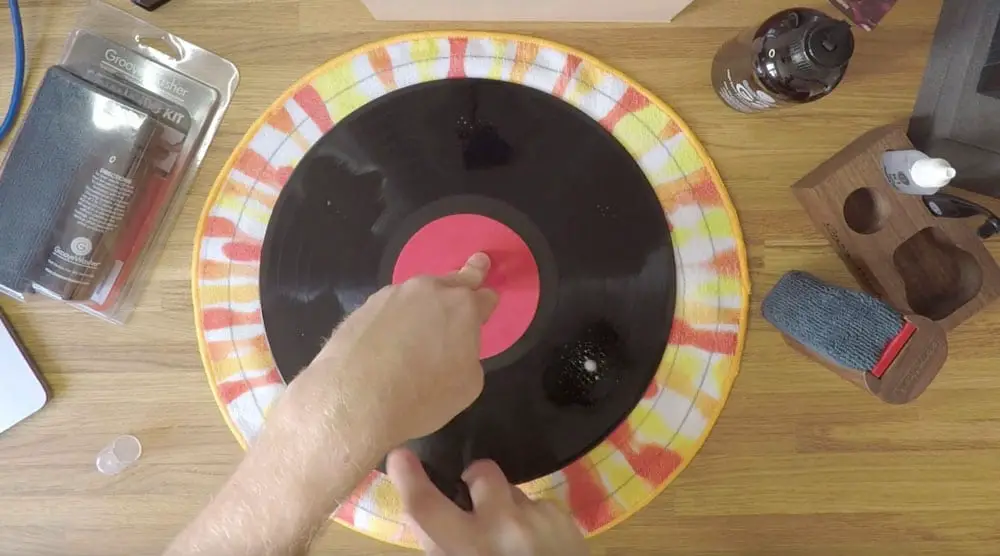
- Utilise the Cleaning Pad to Your Tape.
Lightly apply the leading border of the pad to the tape and wipe the record in concentric arcs (with the grooves, not across). Wipe the unabridged record at to the lowest degree 3 times with moderate pressure.
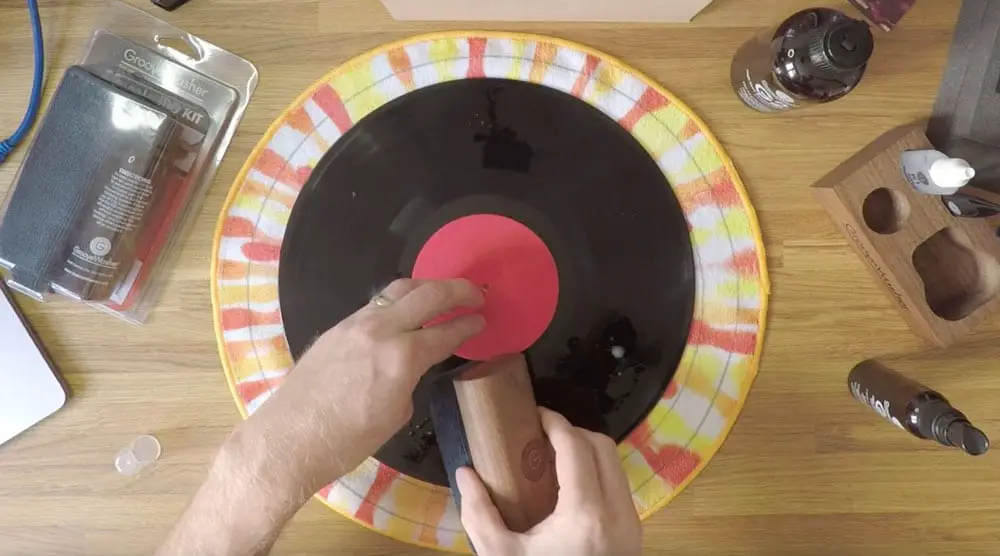
- Brainstorm Rotating The Pad
Rotate the pad to gently dry and groom the surface. If visual inspection shows a trouble area, spray it again with the G2 fluid, wait a few seconds, and use the pad to gently scrub the area, simply only in the management of the grooves. Seriously dirty records may require 2 or iii cleanings.
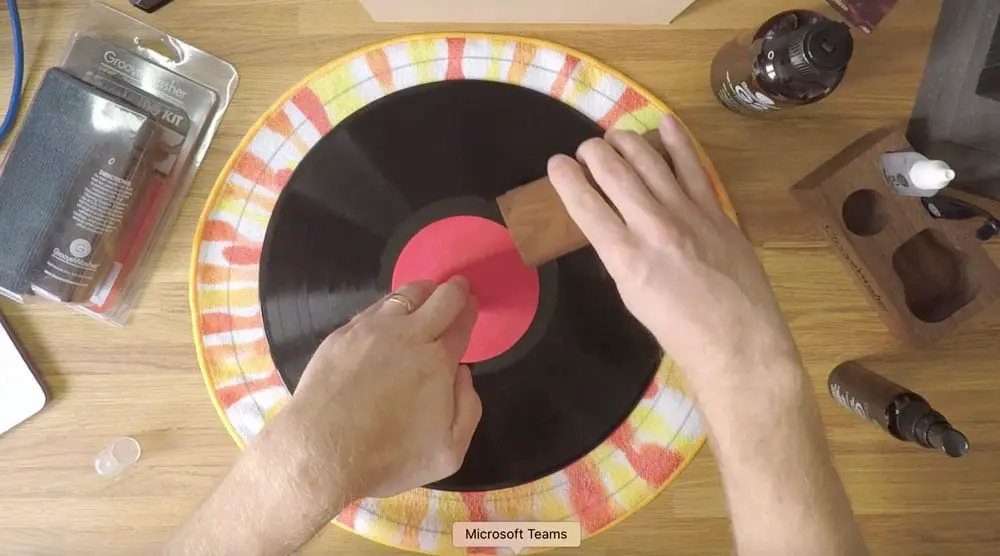
- Allow the record to air dry before playing.
You don't want to play a record wet, or worse, return it to a sleeve while damp. Toast or dish racks make superb air-drying stands.
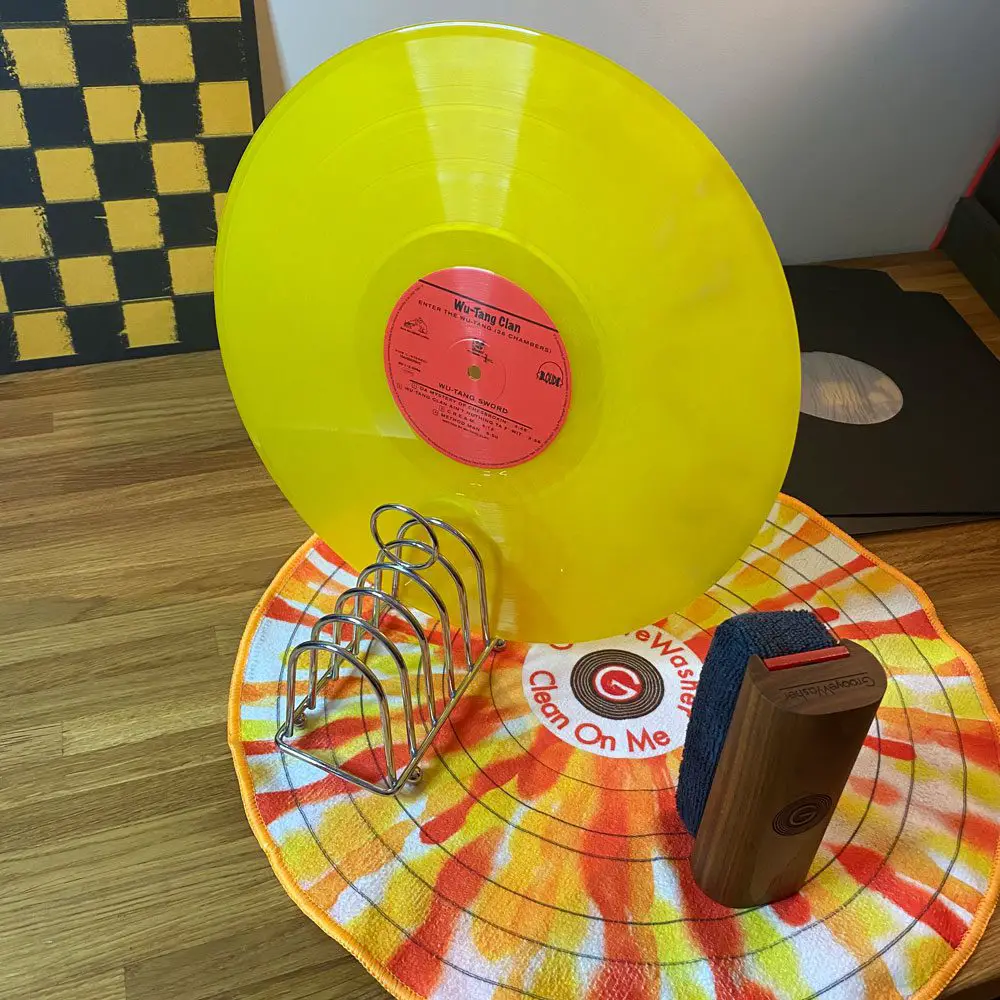
To hear some real results using GrooveWasher, mind to the embedded audio examples below (taken from our full GrooveWasher review). This fairly dirty record starts to clear upward really well past the second and third cleaning.
Top Tip: Clean Your Microfiber Cloth or Supplant information technology Regularly:
When cleaning vinyl by hand, it's important to keep your microfiber fabric clean to avert spreading clay from i record to another.

You can employ distilled water and a little dish detergent to gently clean microfiber cloths or a microfiber cleaning pad, such as the GrooveWasher option mentioned in this article. Thoroughly rinse the pad or fabric, followed by squeezing it to remove moisture.
Allow to air-dry overnight. Avert putting microfiber cloths in the washing automobile if you can, equally this may pick upwards unwanted lint, which could contaminate—or even damage—your records.
PART 2 – Footstep Upwardly Your Game with a Record Cleaning Automobile
You can significantly speed upwards the procedure and potentially improve the upshot by investing in a tape cleaning auto. These primarily come in few different varieties:
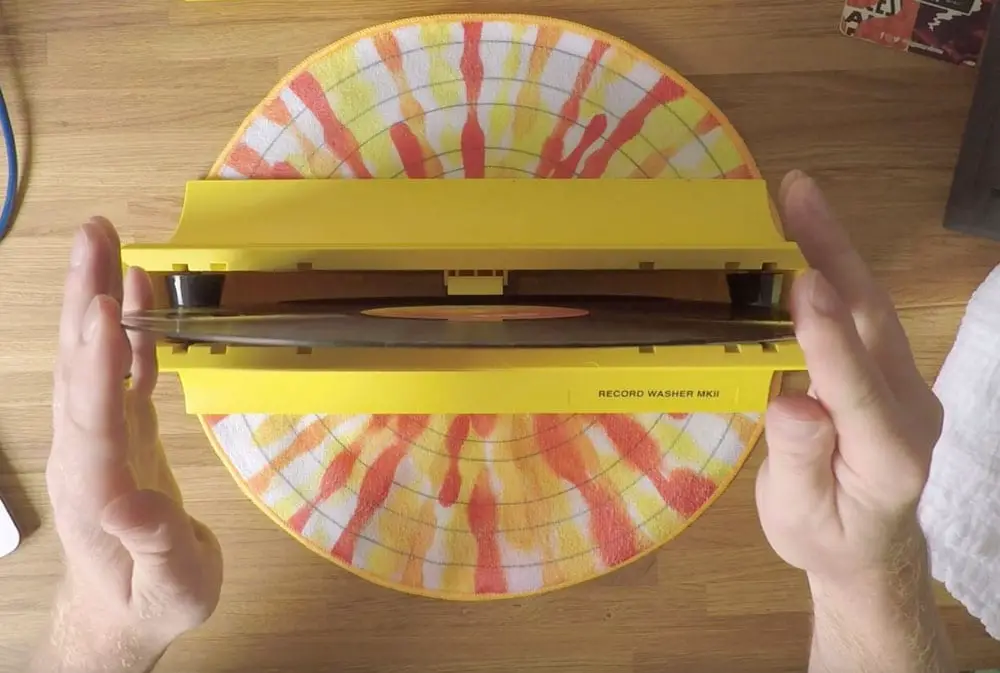
Vinyl Record Baths
Record baths, such as the Spin Clean Tape Washer are a very price-effective way to clean a lot of records in one sitting. Cleaning by mitt can be very effective, merely information technology would have you a long time to clean a large collection or a batch of records from your latest record store shopping binge! The device works by brushing both sides of a record at the same time, while effectively giving your records a bath.Bank check out our full product review, hither.

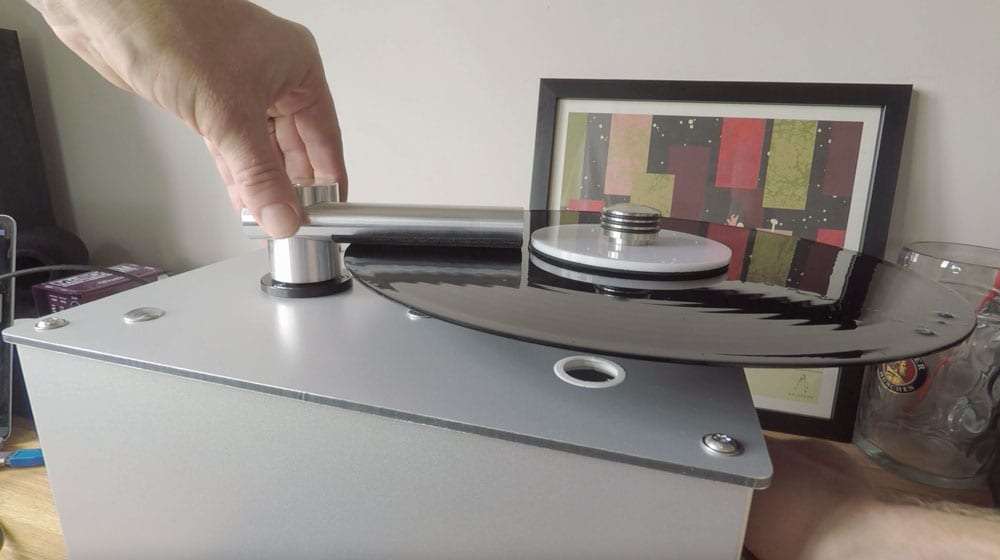
Vacuum-Based Tape Cleaning Machines
Side by side up the record cleaning hierarchy is substantially a purpose-designed vacuum cleaner for your vinyl. A machine like this will crave a petty up-front end investment, merely I can assure you lot it is entirely worth information technology for the amount of time you'll save and the effectiveness of this cleaning method.
The fact remains, tape cleaning machines are the most effective manner to clean vinyl records. They're and so effective because, unlike transmission cleaning, record cleaning machines work by sucking up the applied cleaning solution, which in plough takes all the dirt and grime away with it.

Deep Clean Records with Ultrasonic Cleaning Machines
Ultrasonic cleaning (or cavitation) is regarded by many collectors as the best way to deep clean a record. The process works past creating lots of tiny cavitation bubbles in a cleaning bath. These bubbling grade and collapse, releasing energy as heat and a minor amount of pressure level.
With the right setup, ultrasonic cleaning can assist deep clean the grooves with very little contact – making it an extremely safe approach at the same time.
The catch? Purpose-built ultrasonic cleaners are ofttimes very expensive. Take the Degritter every bit an instance beneath. This unit of measurement will prepare you dorsum $2990 (or £2450).
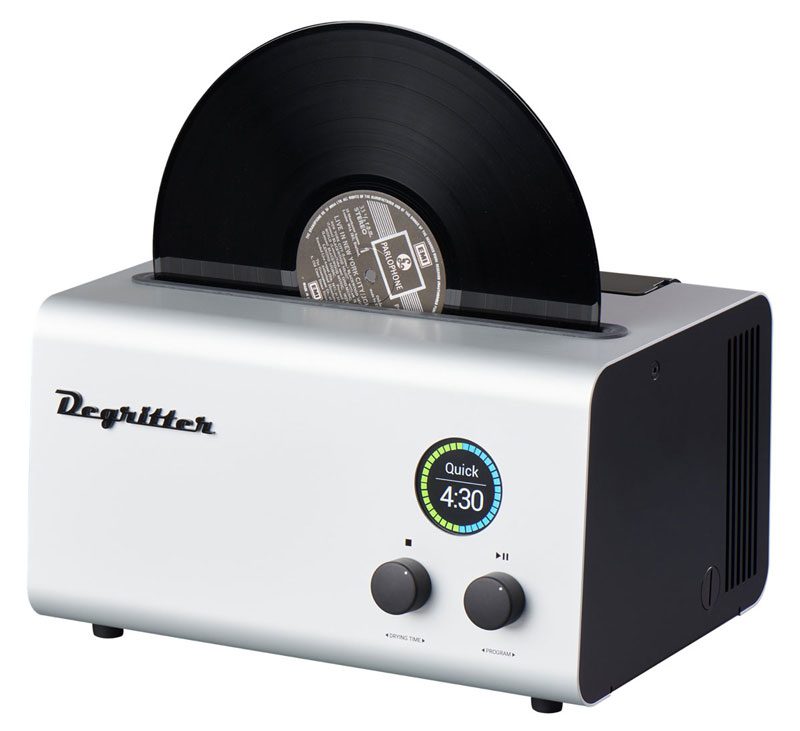
One alternative is to use a cheaper Chinese-fabricated ultrasonic tank, and equip the tank with a motor so the tape can turn while the ultrasonic unit of measurement goes to work on your record. Take this example from WEWU (pictured below). This unit of measurement will make clean up to 5 records in a single ultrasonic tank for $500.
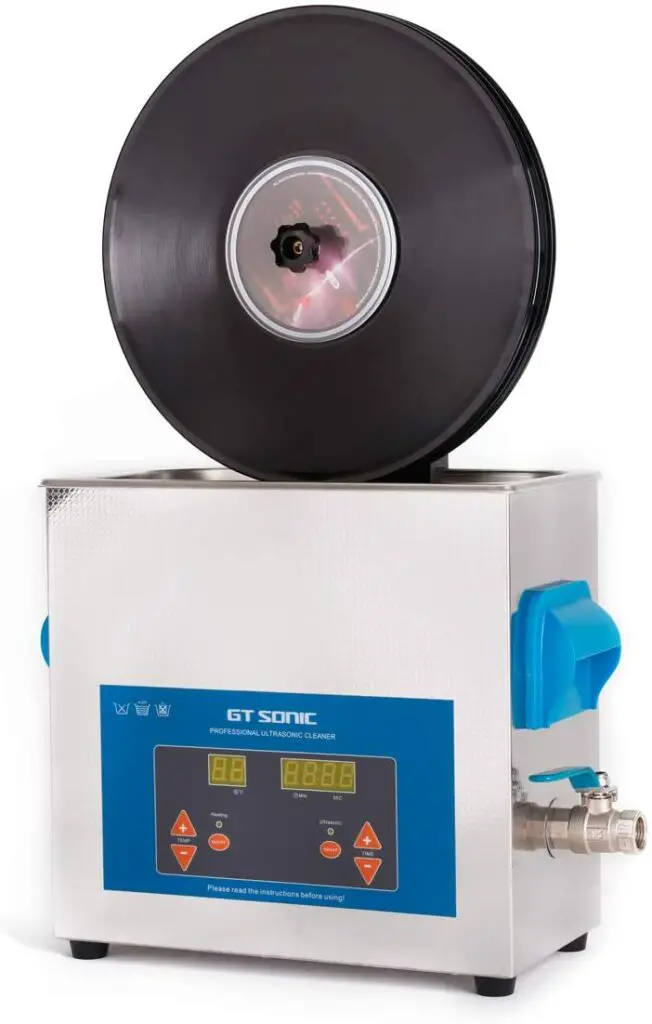
Typically, y'all will make full the unit with distilled water. Never use tap h2o as this contains impurities that tin can clog your record grooves. You tin can improve the results further past adding a surfactant (Groovewasher now makes 1 called G-Sonic). Y'all add ten-drops to every gallon of distilled water, mix it together, then pour the liquid into your ultrasonic tank.
Surfactants help to reduce the water'due south surface tension and assist in the deep cleaning of record grooves. Without the improver of surfactants in any record cleaning fluid, pure water can fail to penetrate the microscopic groove and end up just sitting on the record surface.
Function 3 – Frequently Asked Questions About Record Cleaning
Blare, we've collated the most frequently asked questions we receive nigh tape cleaning: Scroll downwardly for the answer to each question:
How frequently should you clean vinyl records?
The simple answer is, information technology depends. As mentioned earlier in this article, you should use a carbon fiber record castor (before and after each playback) to help reduce static and dust build-up. If you follow this routine and store your vinyl records correctly in a good quality inner sleeve, then you shouldn't actually take to wet clean your records very oft.
How often should y'all clean vinyl records?
It'southward best not to over-clean a vinyl record; simply use your ears. If it sounds dirty and there are pops and clicks, so by all means, requite the tape a clean. The all-time approach is to expect after your records in such a fashion that moisture cleaning is a rare requirement. Prevention is better than cure.
Is it ok to clean vinyl records with booze?
The use of booze to clean vinyl records is a contentious topic. Some swear by it; others stay well-clear.
Here's where we stand: Firstly, you should NEVER use isopropyl alcohol on shellac records every bit information technology will dissolve the surface.
Just also on modern PVC vinyl, it is idea by many to crusade the leaching of plasticizers, making them breakable and subject to excess wear.
Many record cleaners contain some isopropyl alcohol as part of the mix, but as a dominion, we recommend steering clear of any fluid that contains a loftier corporeality of booze. If you tin can smell booze in your record cleaner, chances are, it'southward using far too much. Our motto is: why use a sledgehammer to kill a wing.
How to Clean Former Vinyl Records?
You can make clean quondam vinyl records in merely the same way every bit new vinyl records (so long as they're modernistic PVC and non shellac 78s). Shellac 78s are specially brittle, so yous need to take extra care as they can crack or shatter if you're not careful. When wet cleaning shellac records, make 100% sure the record cleaning fluid does not contain alcohol (see section above on cleaning vinyl records with alcohol).
If an onetime record is especially dirty, you may need to clean information technology multiple times to go the desired issue. You might even discover that the first clean makes the record audio worse at first, as the fluid starts to loosen stubborn dirt and crud. In this case, yous will almost certainly come across gunk start to build on your stylus. If that's the case, finish the tape, clean your stylus (needle), make clean it again, and meet if this improves the situation. Patience will be rewarded; in some cases, nosotros're talking about records that are over 50 – 70 years old.
You may also observe that leaving the record cleaning fluid on the surface for longer than the usual time of upwardly to a minute will give the ingredients more than fourth dimension to piece of work.
Lastly, opting for a stronger record cleaning fluid (such as the new G3 Fluid from GrooveWasher) can improve the results when cleaning very dingy, old records. The merchandise-off when dealing with a stronger fluid is that you will need to perform a second rinse step to ensure no residue is left behind.
How to Deep Clean Vinyl Records?
This question comes up a lot – almost as though deep cleaning is somehow separate from regular record cleaning.
The truth is, deep cleaning your records is a affair of patience and trial and error. By deep cleaning your vinyl records, we assume yous mean getting them as clean as possible, and so by definition, achieving a deep clean depends on how muddied the tape is.
Ultrasonic record cleaning is the all-time way to deep make clean vinyl records that have stubborn and entrenched dirt deep in the groove. (See our section in this article coving ultrasonic record cleaning machines).
That said, in many cases, you can deep clean a vinyl tape perfectly well with a good record cleaning solution. The only way to check if a tape has been "deep cleaned" is to accept before and afterward shots of the record surface using a USB microscope. For some, this might be a step likewise far, just if you want to really see what's going on in those microscopic grooves, it's the merely measurable way to tell across detailed listening tests.
How to Clean Vinyl Records with Windex?
Our advice is to avoid household cleaning products that were never purpose-made and designed to clean vinyl records.
The ingredients on a bottle of Windex is quite vast and I cannot fully guarantee their safety for cleaning records. Therefore we recommend sticking to tape cleaning fluids designed past experienced companies who know what they're doing in a lab.
How to Make clean Vinyl Records with Soap and Water?
Tap water should be avoided at all costs – particularly if you alive in a hard water area. The reason is, regular tap water contains impurities, such as mineral deposits, which tin contaminate and damage records.
Have you lot ever tried putting regular tap h2o in a household iron? Notation how quickly difficult water can clog up your iron with limescale deposits. Our advice is always to use a purpose-made record cleaning fluid; stick to distilled h2o if yous use it to rinse a record, and avoid household cleaning products such as soap.
I've Heard You Can Clean Vinyl Records with Forest Glue – Is This True?
The procedure involves spreading a solid layer of woods glue over the record surface (avoiding the characterization). When left to dry overnight, the gum dries articulate – picking up dirt and grit deep inside the grooves. The idea is, all the grime is removed when peeling dorsum the gum.
I wouldn't like to take the risk on a rare or expensive record; what if the glue doesn't peel off in i piece!? Not to mention the risk of residue contaminating your records and stylus. Information technology's too very time-consuming, and at 1 side per night, it would take you a long time to complete your entire drove. Why take the risk when tape cleaning solutions are relatively inexpensive?
The woods mucilage vinyl cleaning method is popular among some collectors, and while it's ultimately each to their own when information technology comes to record cleaning methods, information technology's not an arroyo we advocate at Sound Matters.
How to Clean Vinyl Records with Vinegar
Don't! By now, I'g sure yous're sensing a pattern – avert alternative cleaning methods. With this one, however, information technology'southward specially of import to notation that vinegar contains acetic acid, which, if mixed with alcohol subsequently down the line from another record cleaning fluid, could risk melting the record and causing permanent damage.
How to Make clean a Record Needle?
When dealing with dirty records, your record needle (more accurately known as the stylus) will undoubtedly build upward gunk and dust as information technology tracks the record groove. Yous'll want to go these records clean equally soon as possible, equally playing dirty records we speed upward the habiliment of your stylus and records.
We recommend cleaning your needle/stylus subsequently each tape with a stylus cleaning kit. Our preferred tape cleaning fluid supplier, GrooveWasher make a slap-up stylus cleaning kit. The brush is long and curved, with an ergonomic handle, making it easy to achieve under the stylus to clean away any crud or dust safely.
Simply employ a modest amount of cleaning fluid and ever pull the brush from back to front so as not to damage the cantilever in the process. For a full guide on how to clean your needle/stylus – check out our full characteristic and video instructions.
How to Make clean Vinyl Records DIY at Dwelling?
We get asked this question a lot: tin can I DIY my ain record cleaning solution. As mentioned earlier in the article, we prefer to leave the chemistry to professionals who have the noesis and background in developing safe and effective record cleaning fluids.
Withal, homemade record cleaning solutions are very popular with many collectors, so if y'all do choose to go downwards this route, here'southward some advice we recommend sticking to:
– E'er use distilled h2o; never use tap water, every bit this contains impurities that volition undoubtedly damage your records. – De-ironized water is non the same as distilled h2o. The procedure of creating de-ironized h2o does non impale off any leaner, and therefore distilled h2o is much safer for cleaning vinyl records. – If you choose to add isopropyl alcohol to your mix, go along the quantity to a depression level. As mentioned, there is much debate about the safety of booze on PVC-based vinyl records, but given the lack of manufacture consensus on safety, it'south all-time to stay on the safe side. i% of your overall cleaning fluid is a good place to start. – Add together a surfactant to your solution to improve the cleaning quality. Surfactants help reduce the surface tension of your cleaning fluid and allow the liquid to penetrate the groove fully. Record grooves exist on a microscopic level, of class, so without a surfactant, your cleaning fluid might only sit on the surface of the record and will not effectively make clean deep into the groove.
Wrapping Up – The Best Mode To Clean Vinyl Records
The aim of the game is to get your records as clean as possible without doing any harm to the tape. There'due south no point using a heavy-handed approach that leaves the deejay spotless but destroys the groove and sound quality in the procedure.
Ask ten people how to clean vinyl records and y'all'll probable go ten dissimilar responses. Generally, you'll hear conflicting advice, as they'll ever be i collector who claims they've been cleaning their records with soap and water or high amounts of alcohol for decades without any adverse effects. Mayhap they accept, perhaps they oasis't; it can be difficult to detect the slow deterioration of a tape over fourth dimension, so y'all've got to question the certainty of such a claim.
A gentle and patient approach is preferable if yous desire to avert harm, and that'southward the advice I advocate. Take your time, and don't forget to savour the music every bit you get along. Vinyl is non a clinical medium, there will ever be some degree of surface noise, simply that'due south all part-and-packet of the 18-carat and authentic experience of music on wax.
Source: https://www.yoursoundmatters.com/clean-vinyl-records/
Posted by: gasshatry1988.blogspot.com


0 Response to "How To Make Vinyl Record Cleaning Fluid"
Post a Comment